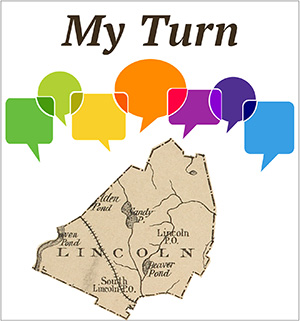 (Editor’s note: Climate Action Lincoln gave a presentation at the State of the Town meeting on Nov. 2, 2021).
(Editor’s note: Climate Action Lincoln gave a presentation at the State of the Town meeting on Nov. 2, 2021).
To the editor:
The global climate crisis has us all wondering what we can do now and for the next generation. The great news is that, as a town, we are not powerless. Lincoln is going to develop a Climate Action Plan that will address climate change on many levels.
Massachusetts is legally committed to net-zero greenhouse gas (GHG) emissions by 2050 and a 50% reduction from 1990 levels by 2030. That means we in Massachusetts must cut our use of fossil fuels by about one-third in eight years — a drastic reduction in the use of natural gas, oil and propane to heat and cool houses, to run our cars, trucks, and buses, and to generate electricity.
For the last year, volunteers from Climate Action Lincoln, a subcommittee of the Green Energy Committee, have been learning about climate plans from our neighboring towns. Lexington, Concord, Carlisle, Weston, Arlington, Cambridge, and Acton have comprehensive plans, and most have Sustainability Managers. We have also met with 12 town boards and committees to hear about their efforts.
While Lincoln has done a lot to protect the environment, become more energy-efficient, and reduce GHG emissions, there is more we can do together as a community.
We are pleased to announce that Jennifer Curtin, Assistant Director of Planning and Land Use, will support our efforts. She is working to secure grant funding for a consultant to lead Lincoln through development of a Climate Action Plan, which will address the interconnected issues of the climate crisis:
- Electrification with renewable energy to reduce GHG emissions
- Mitigation and adaptation to climate impacts
- Ensuring environmental justice and supporting vulnerable populations
- Safeguarding public health
- Creating sustainable and resilient infrastructure
- Protecting and regenerating ecological systems, including back yards, forests, open space, farms, and wetlands
A Climate Action Plan will also coordinate and recommend municipal, commercial, and residential actions. It will address the built environment, transportation, energy production, waste, and land use in Lincoln.
Town-wide participation is critical to developing a Climate Action Plan that will achieve results, not just sit on a shelf or a website. In Lincoln, actions by residents will be crucial to the success of a plan as Lincoln has very small commercial and municipal sectors. The process of developing a plan will include:
- Visioning — Engagement of all residents and stakeholders in town
- Data — Energy use, GHG emissions, carbon storage
- Analysis — Vulnerable populations, housing, infrastructure, transportation
- Goals — Align with state and federal goals; interpret for residents
- Implementation — Timelines, accountable parties, measurement
- Financial implications for the town budget
As the town works to secure funding for the plan, Climate Action Lincoln would like to engage residents. To join our group, receive updates on our progress, or arrange a presentation for your organization, please email ClimateAction@lincolntown.org or reach out to one of our members listed below.
Sincerely,
Climate Action Lincoln
Sue Klem (chair), Roy Harvey, Emily Haslett, Staci Montori, and Lynne Smith
“My Turn” is a forum for readers to offer their views on any subject of interest to other Lincolnites. Submissions must be signed with the writer’s name and street address and sent via email to lincolnsquirrelnews@gmail.com. Items will be edited for punctuation, spelling, style, etc., and will be published at the discretion of the editor. Submissions containing personal attacks, errors of fact, or other inappropriate material will not be published.
Leave a Reply